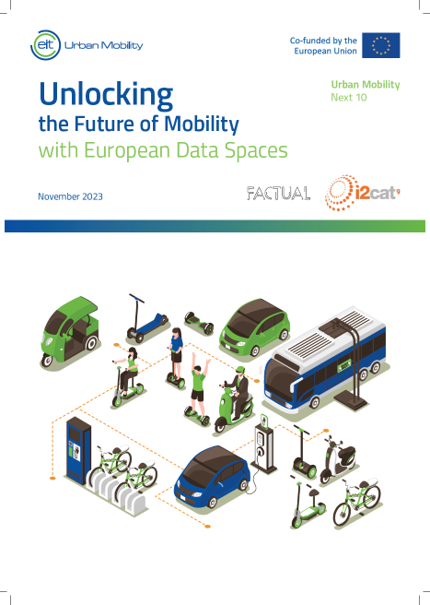Data is a key strategic asset in the framework of the European Strategy for Sustainable and Smart Mobility. Leveraging it will support priorities such as improving road safety, promoting alternative or complementary modes to private cars, mitigating the negative externalities of transport, as well as boosting advanced and personalised mobility services based on digitalisation, such as demand-responsive transport or the application of algorithms based on artificial intelligence.
To move towards this vision, it is essential to prioritise greater availability and accessibility to data, and to promote trusted environments for secure data sharing. Enter data spaces…
What are Data Spaces?
Data spaces are ecosystems that facilitate the voluntary, sovereign, and secure sharing of data. In mobility and other strategic sectors (tourism, energy, health, agri-food, etc.), data spaces promise to enable new public and commercial business models and services by unlocking access and availability to existing (and new) data while respecting usage control and privacy for data owners.
What you will find in this study
This study explores the foreseen challenges in developing, deploying and operating mobility data spaces in more detail, analysing the commercialisation aspects of transitioning from conceptual design to piloted innovation to a sustainable, in-production service model. The technology itself is homegrown in Europe through various initiatives, forums and standardisation groups. It is now in an accelerated development and convergence phase between complementary and overlapping visions, coupled with the piloting of new governance models that are key to a data space’s operation encompassing public and private sector actors in mobility value chains.
As with most technological advances, this stage in product development is where attracting private sector interest and investment is the most critical. From MaaS solution providers to freight operators to large OEMs, businesses in the mobility sector are generating and aggregating increasingly large volumes of proprietary data. In these new trusted environments that data space can provide, win-win business models with clear incentives will have to be defined to help overcome resistance to change in a historically conservative and data-protective industry culture, as well as provide a sufficiently attractive ‘carrot’ – the return on investment (economic and strategic) to justify such investment.

What’s next for Mobility Data Space?
Mobility data space is a concept backed by the European Union to have the potential to positively disrupt the mobility sector towards a more efficient, sustainable and safe transport system. But will more local public and private sector actors buy into this vision? And will mobility data spaces live up to the hype? This report addresses these questions and provides a set of key recommendations for cities and businesses to assess the application of data spaces for their respective needs.
The study was unveiled during the 2023 edition of Tomorrow Mobility, where its co-authors presented the key takeaways of the report.
Authors: Josep Laborda (Factual), Eglantina Dani (Factual), Luke Bates (Factual), Rizkallah Touma (i2CAT Foundation), Jim Ahtes (i2CAT Foundation)




